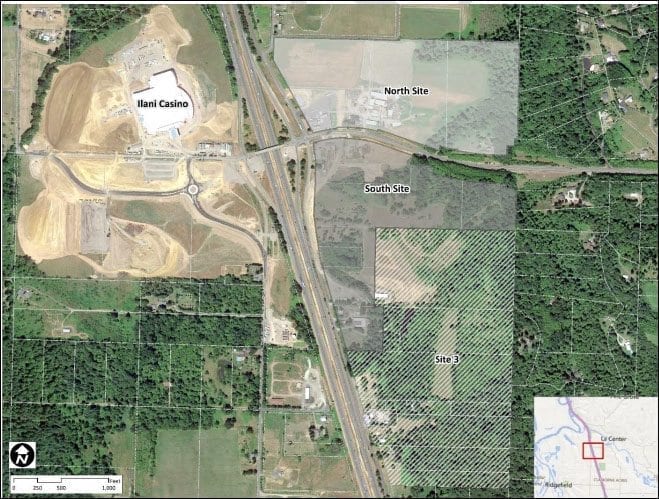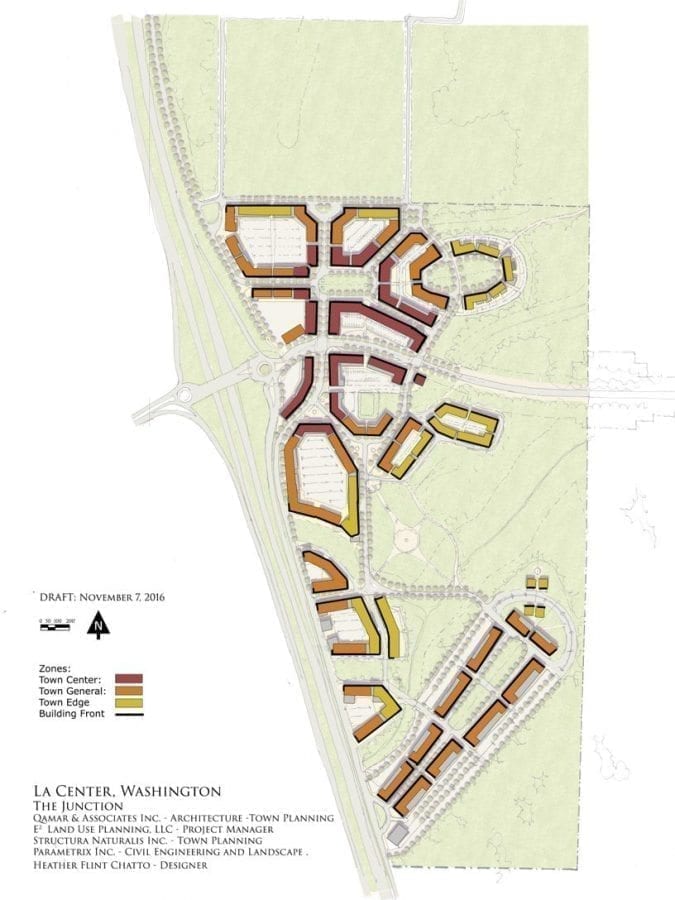LA CENTER — Trying to keep pace with the rapidly changing landscape to their west — where the Cowlitz Indian Tribe’s new ilani casino-resort is now fewer than three months away from its mid-April opening — city leaders in La Center are pushing forward with plans to turn now-bare land near the city’s Interstate 5 junction into a thriving, mixed-use development that will feature commercial anchors and a good mix of retail shops, cafes, restaurants and residential areas.
At a packed meeting held Wed., Jan. 25, at the city’s Community Center, La Center City Councilmembers unanimously approved a $5 million bond to fund the city’s sewer extension west to the La Center Junction adjacent to I-5 and closest to the new ilani casino-resort.
At the heart of the $5 million sewer bond is the Cowlitz Tribe’s agreement to pay the bond through their Cowlitz Tribal Gaming Authority (CTGA). The gesture of goodwill was part of an intergovernmental agreement between the city of La Center and the tribe, signed in March of 2016, which paved the way for the tribe’s $32 million renovations at the I-5 junction and the start of the ilani casino-resort construction.
The tribe offered to pay for the sewer extension, which will run from the city’s wastewater treatment facility to the western edge of La Center’s municipal boundary near I-5, as a way to sweeten the deal.
City leaders in La Center have said for many years that getting the city’s sewer services to the commercial and industrial land near I-5 was critical to the city’s future, as many believe the new ilani casino will pull customers from the three privately owned card rooms operating within La Center’s downtown core, which provide about three-fourths of the city’s revenues via gambling taxes.

The new bond agreement shields the city from any liability for repayment of the $5 million — the CTGA will repay the debt and if they are unable, the Mohegan Tribal Gaming Authority has agreed to pay the bill. If both gaming authorities fail to make payments, the Columbia State Bank will act as the collection agency. And if the costs of extending the sewer to the I-5 junction exceed $5 million? The two tribal gaming authorities have agreed to cover all costs associated with the sewer extension.
City hits pause button on development at I-5 junction
With the sewer bond in place, the La Center City Council quickly moved on to extending a development moratorium at the I-5 junction, to allow the city to develop a more coherent set of development codes for the junction’s unique mix of industrial, commercial, retail and residential land.
The city paid $100,000 in late 2016 to have a consulting firm begin economic development studies on the 205-acre I-5 junction. About 120 acres of the junction are zoned for commercial uses, there is a very small piece of residential zoning in there and the rest could be used for light industrial purposes.
At a work session held before the council meeting on Wednesday night, Jan. 25, Eric Eisemann, consulting planner for the city, told La Center councilmembers that the study had identified a “town center” development, much like the mixed-use plans seen in DuPont, Wash., a community south of Tacoma known for its network of planned, mixed-use “villages” that each offer a unique design style.
After studying the La Center junction’s physical location, attributes, socio-economic trends, commercial area market analysis and freeway interchanges, the city’s consultants came up with a few key conclusions:
- The area’s access to markets is good, with strong regional growth rates.
- The area may not be prime for destination shopping, given its proximity to Oregon, which has no sales tax.
- The town center approach, like DuPont’s development, is “most probably to succeed” the consultants said.
- If the La Center Junction does not gain a “major investor,” the consultants predict that growth in that part of the city will be “slower than hoped.”
- Due to the area’s close proximity to the casino-resort, development of buildings between 7,500 and 10,000 square feet will fit in better than “big box” commercial buildings, which range from 31,000 to 123,000 square feet.
Because the city has not yet set development regulations for the junction’s commercial, light industrial and mixed-use areas, the city council considered extending a six-month development moratorium at the junction on Wednesday night.
Steve Horenstein, a Vancouver attorney representing one of the private property owners who own the area’s industrial zone property, urged the councilmembers to shorten the development moratorium extension from six months to three months.
“I’m concerned about the length of the moratorium,” Horenstein said. “Moratorium, for folks who build buildings for commercial use, is a very evil word … developers run from communities that use that word. They just look elsewhere.”

Councilmember Al Luiz asked the city’s attorney, Daniel Kearns, and Eisemann, the city’s consulting planner, to explain why the moratorium extension could not be shortened to three months and then, if needed, extended again.
“Doing it for three months rather than six months doesn’t seem like that would be something that would be unreasonable,” Luiz said. “Is there a cost or a problem with doing three months and then deciding … we need to extend it more?”
Kearns said it was possible, but that the city ran a risk of having a develop come in before they’d nailed down specific development guidelines for the area.
“The risk you run is that Washington has very pro-developer vesting laws, so when an application is submitted, it fixes in place the development code on the books at that time,” Kearns explained. “The risk is that someone submits a development application before the new development regulations (are on the books).”
Kearns added that, in his opinion, most developers would want to take advantage of the city’s array of new development options that will be available at the junction and would not want to get saddled with the current development code.
Eisemann told the councilmembers that a six-month development moratorium extension, which would pause development at the junction until July 27, was more prudent.
“I think I would be selling you a false bill of goods if I tell you that you will be done in three months’ time,” Eisemann said.
But Horenstein cautioned that the city might miss out on a good window of opportunity if it extended the moratorium past the tribal casino’s expected mid-April opening.
“There will never be a better time for developers to look at the city than when that casino opens,” Horenstein said. “I would hope we’d work faster and do this in a couple of bites and not need the second bite.”
In the end, only one of the city councilmembers, Joe Valenzuela, voted against the six-month moratorium extension. Mayor Greg Thornton has said that the city can remove the development moratorium if city planners and councilors approve development regulations before the agreed-upon July 27 end of the moratorium.




